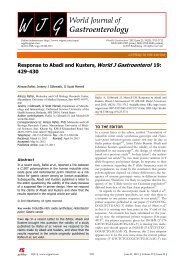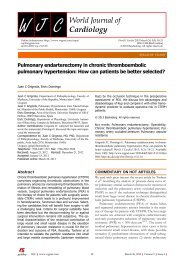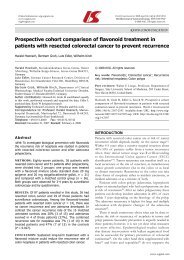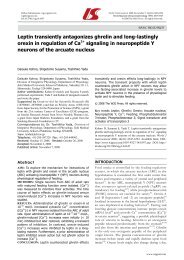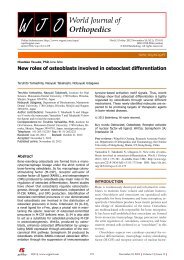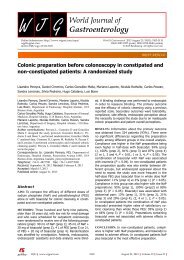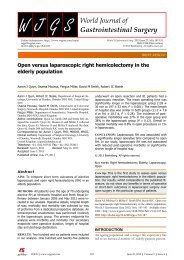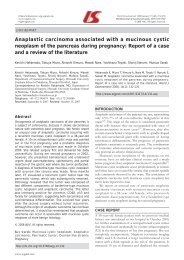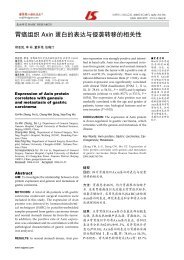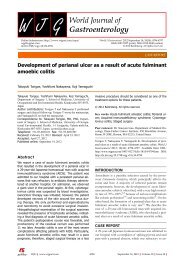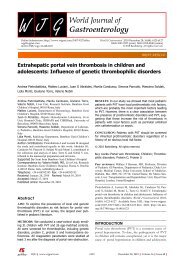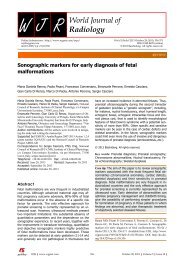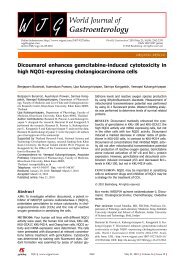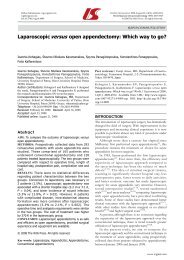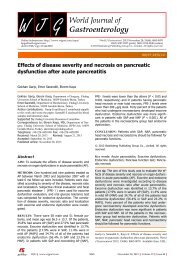and HBeAg(-) patients - World Journal of Gastroenterology
and HBeAg(-) patients - World Journal of Gastroenterology
and HBeAg(-) patients - World Journal of Gastroenterology
Create successful ePaper yourself
Turn your PDF publications into a flip-book with our unique Google optimized e-Paper software.
Table 2 Distribution <strong>of</strong> N-acetyltransferase 2 polymorphism <strong>and</strong> the risk <strong>of</strong> cancer<br />
Genetic polymorphism NAT2 a<br />
analysis reported a strong association between smoking<br />
<strong>and</strong> the development <strong>of</strong> CRC [12] . However, smoking is<br />
currently not recognized as a risk factor for CRC by the<br />
International Agency for Research on Cancer (IARC) or<br />
the US Surgeon General [12] . Sørensen et al [21] studied the<br />
association between NAT1 <strong>and</strong> NAT2 polymorphisms,<br />
smoking, meat consumption <strong>and</strong> CRC risk in 379 cancer<br />
<strong>patients</strong> <strong>and</strong> 769 healthy subjects. In that study, only the<br />
NAT1 polymorphism affected cancer risk. However, the<br />
NAT1 <strong>and</strong> NAT2 fast acetylation phenotype increased the<br />
risk <strong>of</strong> CRC among <strong>patients</strong> who smoked more cigarettes,<br />
suggesting that N-acetylation status affects the relationship<br />
between smoking <strong>and</strong> CRC risk.<br />
In the present study, most subjects in the two groups<br />
had never smoked, but the rate <strong>of</strong> ex-smokers was higher<br />
in the case group than in the control group. Once diagnosed<br />
with cancer, individuals tend to break old habits<br />
that may affect the prognosis <strong>and</strong> treatment <strong>of</strong> the disease<br />
even if it is not possible to reverse the previous damage.<br />
The slow acetylation phenotype was more frequent among<br />
smokers <strong>of</strong> the case group, suggesting an increased risk<br />
<strong>of</strong> cancer (OR: 1.97, 95% CI: 1.02-3.79) in subjects with<br />
this phenotype. A higher frequency <strong>of</strong> the slow acetylation<br />
phenotype among <strong>patients</strong> with lung <strong>and</strong> bladder cancer<br />
has been demonstrated in other studies. Carcinogens<br />
WJG|www.wjgnet.com<br />
Cancer, n (%) Control, n (%) P OR (95% CI)<br />
All 147 212<br />
Mx/Mx 88 (59.8) 110 (51.9) 0.19 1<br />
W/Mx 44 (30.0) 83 (39.1) 0.66 (0.42-1.05)<br />
W/W 15 (10.2) 19 (8.9) 0.99 (0.47-2.05)<br />
Slow 88 (59.8) 110 (51.9) 0.17 1.38 (0-2.12)<br />
Fast 59 (40.1) 102 (48.1)<br />
Female 76 127<br />
Mx/Mx 42 (55.2) 58 (45.6) 0.07 1<br />
W/Mx 23 (30.2) 58 (45.6) 0.55 (0.29-1.02)<br />
W/W 11 (14.4) 11 (8.6) 1.38 (0.55-3.48)<br />
Slow 42 (55.2) 58 (45.6) 0.24 1.47 (0.83-2.60)<br />
Fast 34 (44.7) 69 (54.3)<br />
Male 71 85<br />
Mx/Mx 46 (64.8) 52 (61.1) 0.67 1<br />
W/Mx 21 (29.5) 25 (29.4) 0.95 (0.47-1.92)<br />
W/W 4 (5.6) 8 (9.4) 0.57 (0.16-2.00)<br />
Slow 46 (64.7) 52 (61.1) 0.76 0.86 (0.45-1.65)<br />
Fast 25 (35.2) 33 (38.9)<br />
a Homozygous individuals with genotype W/W, <strong>and</strong> heterozygote W/Mx, are grouped into fast acetylation phenotype, while homozygous Mx/Mx are<br />
grouped in slow acetylators. The percentages <strong>of</strong> data are in parentheses. NAT2: N-acetyltransferase 2; OR: Odds ratio; 95% CI: Confidence interval.<br />
Table 3 Comparison between meat intake <strong>and</strong> risk <strong>of</strong> <strong>of</strong> cancer<br />
in rapid acetylator <strong>patients</strong> n (%)<br />
Cancer Control P OR Lower 95% CI /<br />
upper<br />
All 59 102<br />
High meat intake 1 44 (74.5) 60 (58.8) 0.06 2.05 1.01/4.16<br />
Low meat intake 2 15 (25.5) 42 (41.2)<br />
1 More than 3 time per week; 2 Less than 3 times a week. OR: Odds ratio;<br />
95% CI: Confidence interval.<br />
Silva TD et al . NAT2 <strong>and</strong> colorectal cancer<br />
Table 4 Correlation between genotypes <strong>and</strong> risk for cancer<br />
in smokers or ex-smokers<br />
Genetic<br />
polymorphism<br />
Cancer,<br />
n (%)<br />
Control,<br />
n (%)<br />
P OR (95% CI)<br />
NAT2 a<br />
All 65 87<br />
Mx/Mx 40 (61.5) 39 (44.8) 0.09 1<br />
W/Mx 22 (33.8) 39 (44.8) 1.82 (0.92-3.60)<br />
W/W 3 (4.6) 9 (10.3) 3.08 (0.77-12.22)<br />
Slow 40 (61.5) 39 (44.8) 0.06 1.97 (1.02-3.79)<br />
Fast 25 (38.5) 48 (61.0)<br />
a Homozygous individuals with genotype W/W, <strong>and</strong> heterozygote W/Mx,<br />
are grouped into fast acetylation phenotype, while homozygous Mx/Mx<br />
are grouped in slow acetylators. NAT2: N-acetyltransferase 2; OR: Odds<br />
ratio; 95% CI: Confidence interval.<br />
present in tobacco are metabolized by NAT enzymes <strong>and</strong><br />
activation <strong>of</strong> these enzymes is reduced in slow acetylators,<br />
thus increasing the risk <strong>of</strong> cancer [22] .<br />
An association between red meat consumption <strong>and</strong><br />
a higher risk <strong>of</strong> CRC has been reported in case-control<br />
studies, prospective epidemiological studies <strong>and</strong> in a recent<br />
meta-analysis [23] . The last study suggested that this<br />
increased risk is due to the production <strong>of</strong> polycyclic aromatic<br />
hydrocarbons <strong>and</strong> heterocyclic amines when meat is<br />
cooked at high temperatures [24] .<br />
Tamer et al [25] , studying 125 <strong>patients</strong> with CRC <strong>and</strong> 82<br />
healthy subjects, observed an association between NAT2<br />
polymorphisms <strong>and</strong> cancer development. In that study,<br />
high protein intake was found to be correlated with an increased<br />
risk <strong>of</strong> colon cancer (OR: 1.73, 95% CI: 1.10-3.07).<br />
Patients with the NAT2 * 14A (M4 allele) fast acetylation<br />
phenotype <strong>and</strong> high meat intake presented an increased<br />
risk <strong>of</strong> CRC (OR: 3.03, 95% CI: 1.56-5.86). In the present<br />
study, the risk <strong>of</strong> cancer was higher among <strong>patients</strong> consuming<br />
meat more than 3 times per week (OR: 1.65, 95%<br />
763 February 14, 2011|Volume 17|Issue 6|



